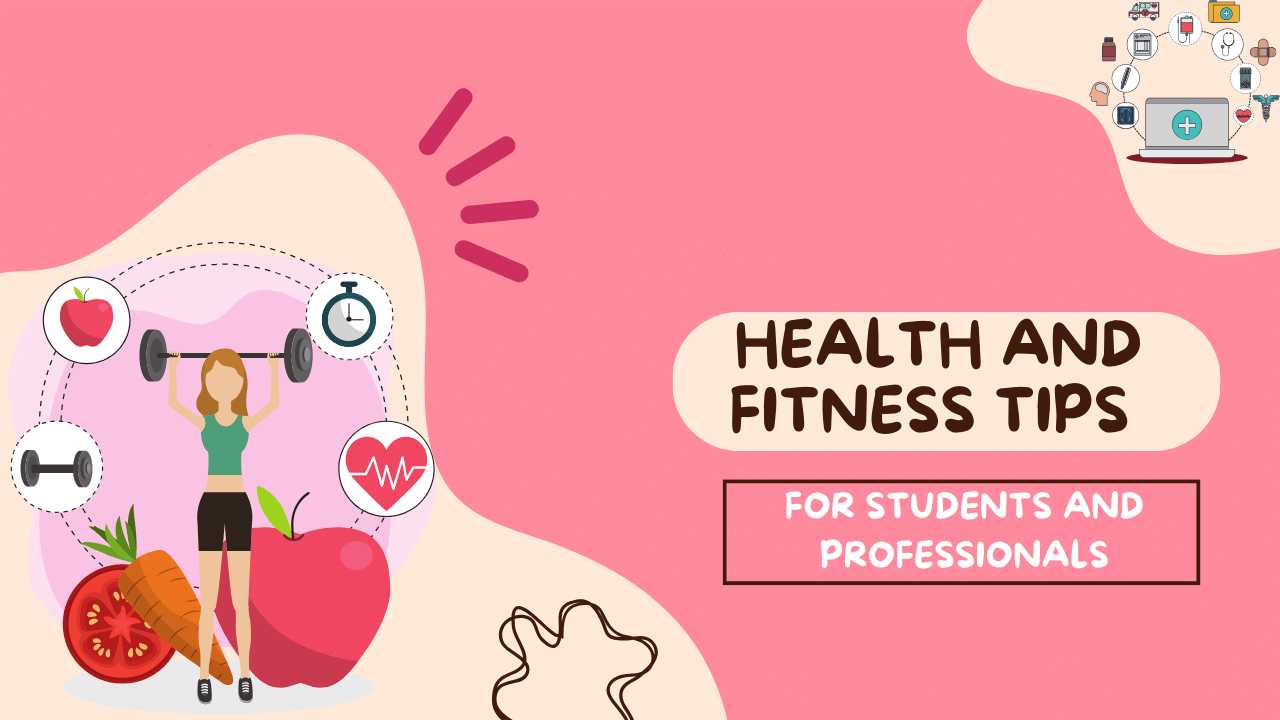Introduction
For students and professionals alike, achieving a balance between academic or work responsibilities and personal life can be a daunting task. Health and fitness often take a backseat when deadlines and commitments pile up. However, integrating health and fitness tips into your everyday routine is crucial for long-term physical and mental well-being. This article aims to provide you with essential health and fitness tips for students and professionals, helping you maintain energy, focus, and overall health as you navigate through your busy life.
The Importance of Health and Fitness
Health and fitness are vital for students and professionals. Good health and fitness lead to better academic and work performance. When students and professionals maintain health and fitness, they feel more energetic and focused. This positively affects their studies and careers.
For students, health and fitness mean better memory, concentration, and exam results. For professionals, health and fitness mean more creativity, better decisions, and job satisfaction.
However, maintaining health and fitness can be tough. Students and professionals often have tight schedules. Students may struggle to exercise and eat well due to classes and study time. Professionals might find it hard to stay fit while working long hours or traveling.
Despite these challenges, students and professionals need to make health and fitness a priority. Small changes in daily routines can make a big difference. These changes can help students and professionals reach their academic and career goals while staying healthy.
These health and fitness tips for students and professionals will help you maintain your health.
Nutrition Tips
Good nutrition is key for health and fitness, both for students and professionals. Here’s why it’s crucial, how to make balanced meals, the perks of smart snacking, and the importance of hydration.
Importance of Proper Nutrition
- Proper nutrition is a must for physical and mental wellness. It powers your body and brain and keeps your energy up.
- A well-fed body fights infections better and heals quicker when sick.
- Mix up your foods. Include proteins, grains, fruits, veggies, and fats.
- Watch your portions. Half veggies and fruits, a quarter protein, and a quarter grains is a good rule.
- Have fruits, nuts, yogurt, and whole-grain snacks handy.
- Planning for healthy snacks helps you skip the unhealthy ones like chips or candy.
- Drink at least eight 8-ounce glasses of water daily.
- Cut back on sugary and caffeinated drinks. They can dehydrate you and add extra calories.
Focusing on proper nutrition, balanced meals, healthy snacks, and hydration can significantly boost health and fitness for students and professionals. It can help maintain energy levels and improve brain function.
Exercise and Fitness Tips
- Motivation is key. Aim for small, realistic goals.
- Just start! The beginning is often the hardest part.
- Pick what you love. Running, swimming, yoga – stick to what makes you happy.
- Choose activities you can keep doing for long-term health and fitness.
- Be part of a group. Fitness clubs are common in schools and communities.
- Group fitness can be motivating and social, boosting your health and fitness journey.
- Change it up. Mix strength training, cardio, and stretching.
- This mix keeps workouts fresh and targets different body parts.
Starting a new fitness routine, selecting exercises you enjoy, participating in group activities, and incorporating various types of exercises are essential tips for maintaining health and fitness for students and professionals. Regular exercise can enhance physical and mental health, improve mood, and increase overall well-being.
Mental Health Tips
Managing Stress
- Identify triggers: Recognize what causes stress.
- Healthy habits: Exercise and meditation can alleviate stress.
- Avoid emotional eating: Turn to activities, not food, when stressed.
Sleep
- Create a schedule: Stick to regular sleep times.
- Prepare for bed: Dim lights and limit screen time before sleep.
- Restful environment: Make your bedroom quiet and comfortable.
Time Management
- Prioritize tasks: Focus on what’s most important.
- Break tasks down: Smaller tasks are less overwhelming.
- Use a planner: Track deadlines and plan your day.
Managing stress, getting adequate sleep, and effective time management are crucial mental health tips for maintaining health and fitness for students and professionals. Balancing work, school, and personal life can be challenging, but with the right strategies, you can improve mental well-being, reduce stress, and enhance productivity.
Sexual Health
Preserving sexual health is a crucial health and fitness tips for students and professionals. Here are some tips to keep in mind:
- It’s essential for students and professionals to have regular STI screenings. Many educational institutions offer these at a low cost or even for free.
- Always employ protective measures, like condoms, during sexual encounters. This is crucial for preventing STIs.
- Clear communication with your partner about sexual health is vital. It ensures that you both understand expectations and boundaries.
- Regular self-checks for any unusual changes can catch potential issues early.
- If you’re concerned about your sexual health, don’t hesitate to consult a healthcare provider. They can offer advice, testing, and treatment.
Sexual health is a key part of health and fitness for students and professionals. By following these tips, you can safeguard your sexual health while promoting your overall well-being.
Illness Prevention
Staying healthy and preventing illness is a crucial aspect of health and fitness for students and professionals, especially in communal living spaces. Here are some strategies to help you maintain good health:
- One of the simplest and most effective ways to prevent illness is regular hand washing. Make sure to wash your hands thoroughly, especially after being in public spaces or using communal facilities.
- To minimize the spread of germs, avoid sharing personal items like towels, toothbrushes, and razors with others.
- Regularly cleaning and disinfecting communal living spaces can help reduce the spread of germs.
- Drinking plenty of water can help boost your immune system and keep you healthy.
- Staying up-to-date with vaccinations can prevent many common illnesses, especially in communal living spaces.
- Covering your mouth and nose with a tissue or your elbow when coughing or sneezing can help prevent the spread of germs.
- If you’re feeling unwell, it’s best to stay home and rest to avoid spreading illness to others.
- If you have symptoms that don’t improve or worsen, seek medical advice to get the appropriate treatment.
Maintaining health and fitness for students and professionals involves taking preventive measures to stay healthy and avoid illness, especially in communal living spaces. By following these strategies, you can protect yourself and others from getting sick.
Health and Fitness Tips for Students
Staying healthy and fit is crucial for students. Here are some tailored tips to help:
- With a busy schedule, it can be challenging for students to find time for exercise. Consider walking or biking to class, taking the stairs instead of the elevator, and scheduling short workout sessions between classes.
- Students often have limited time and resources for meal planning. Focus on easy-to-prepare, balanced meals and snacks. Opt for whole grains, lean proteins, fruits, and vegetables. Avoid excessive fast food and sugary drinks.
- College life can be stressful. Practice relaxation techniques such as deep breathing, meditation, or yoga. Ensure you get enough sleep and take breaks to recharge.
Health and Fitness Tips for Professionals
Professionals also need to prioritize their health and fitness. Here are some tips to stay on track:
- Schedule workouts as you would any important meeting. Utilize lunch breaks, and consider walking or cycling to work. Try short, high-intensity workouts if time is limited.
- Plan your meals ahead of time to avoid last-minute unhealthy choices. Stock your workplace with healthy snacks and opt for balanced meals during lunch breaks.
- The professional world can be demanding. Take short breaks during the workday to destress and clear your mind. Engage in activities you enjoy outside work to maintain a work-life balance.
In conclusion, both students and professionals can benefit from these health and fitness tips. Remember, maintaining a healthy lifestyle requires consistent effort, but the rewards are worth it.
Conclusion
In summary, we’ve covered a range of health and fitness tips for students and professionals. From eating well and exercising to managing stress and preventing illness, these tips are key to a healthy lifestyle. Remember, maintaining good health is a lifelong journey. By following these health and fitness tips for students and professionals, you can create a healthier, more balanced life.
FAQs
1. How can you improve your fitness as a student?
Start by incorporating short bursts of physical activity into your daily routine.
2. What is the best way to improve health and fitness?
Combine a balanced diet with regular exercise and adequate sleep.
3. How can physical fitness help you as a student?
Physical fitness can boost concentration, energy levels, and overall well-being.
4. What are the 5 best ways to improve physical fitness?
1. Cardio exercises
2. Strength training
3. Flexibility exercises
4. Balanced diet
5. Adequate sleep
5. What are 10 ways to improve your fitness level?
1. Cardio exercises
2. Strength training
3. Flexibility exercises
4. Balanced diet
5. Adequate sleep
6. Regular exercise
7. Stay hydrated
8. Manage stress
9. Consistency
10. Set achievable goals
6. What are the most common fitness goals?
1. Weight loss
2. Building muscle
3. Improving endurance
4. Increasing flexibility
5. General health improvement




